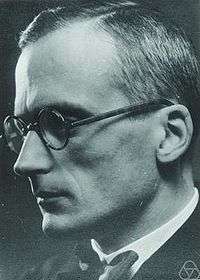Hellmuth Kneser
| Hellmuth Kneser | |
|---|---|
|
Hellmuth Kneser, ca. 1930. | |
| Born | 16 April 1898 |
| Died | 23 August 1973 (aged 75) |
| Nationality | Baltic German |
| Fields | Mathematics |
| Institutions | University of Tübingen |
| Alma mater | University of Göttingen |
| Doctoral advisor | David Hilbert |
| Doctoral students |
Reinhold Baer, Wolfgang Walter |
Hellmuth Kneser (16 April 1898 – 23 August 1973) was a Baltic German mathematician, who made notable contributions to group theory and topology. His most famous result may be his theorem on the existence of a prime decomposition for 3-manifolds. His proof originated the concept of normal surface, a fundamental cornerstone of the theory of 3-manifolds.
He was born in Dorpat, Russian Empire (now Tartu, Estonia) and died in Tübingen, Germany. He was the son of the mathematician Adolf Kneser and the father of the mathematician Martin Kneser. He assisted Wilhelm Süss in the founding of the Mathematical Research Institute of Oberwolfach and served as the director of the institute from 1958 to 1959.
Kneser had formulated the problem of non-integer iteration of functions and proved the existence of the entire Abel function of the exponential; on the base of this Abel function, he constructed the functional square root of the exponential function as a half-iteration of the exponential, i.e. a function φ such that φ(φ(z)) = exp(z).[1]
Kneser was a student of David Hilbert. He was an advisor of a number of notable mathematicians, including Reinhold Baer.
Hellmuth Kneser was a member of the NSDAP and also the SA.[2] In July 1934 he wrote to Ludwig Bieberbach a short note supporting his anti-semitic views and stating: "May God grant German science a unitary, powerful and continued political position."[3]
References
- ↑ H.Kneser (1950). "Reelle analytische Lösungen der Gleichung φ(φ(x)) = ex und verwandter Funktionalgleichungen". Journal fur die reine und angewandte Mathematik. 187: 56–67.
- ↑ Die Carathéodory-Nachfolge in München 1938-1944 by Freddy Litten
- ↑ Sanford L. Segal, Mathematicians under the Nazis, Princeton University Press, 2003, page 276
External links
- O'Connor, John J.; Robertson, Edmund F., "Hellmuth Kneser", MacTutor History of Mathematics archive, University of St Andrews.
- Hellmuth Kneser at the Mathematics Genealogy Project
